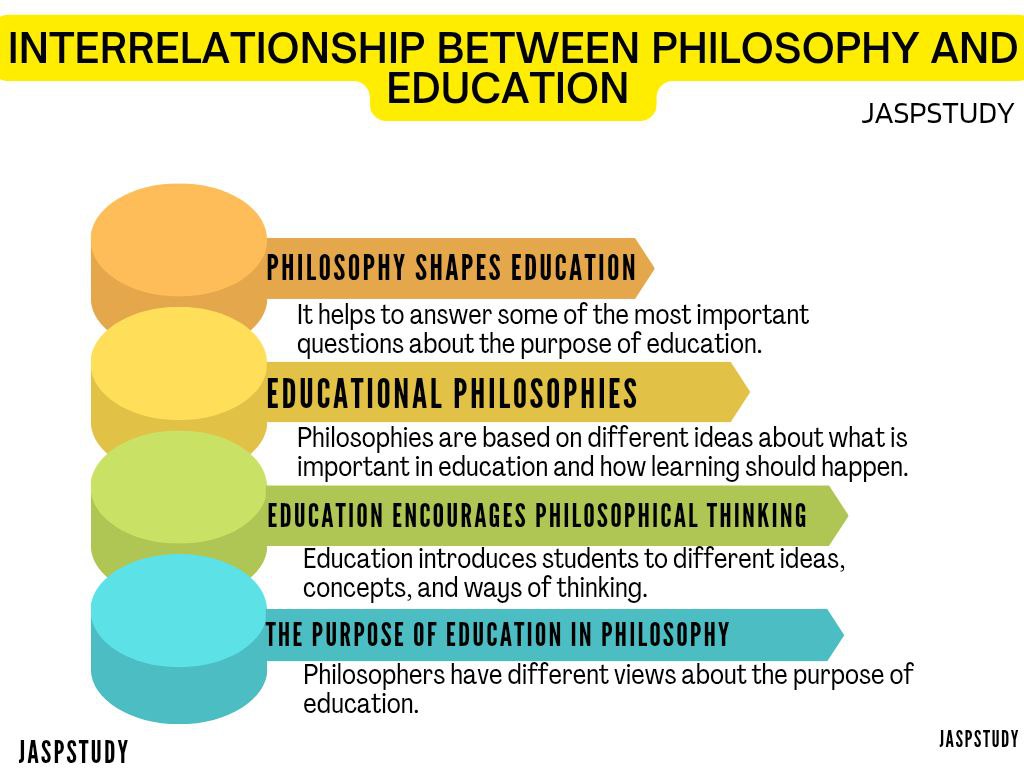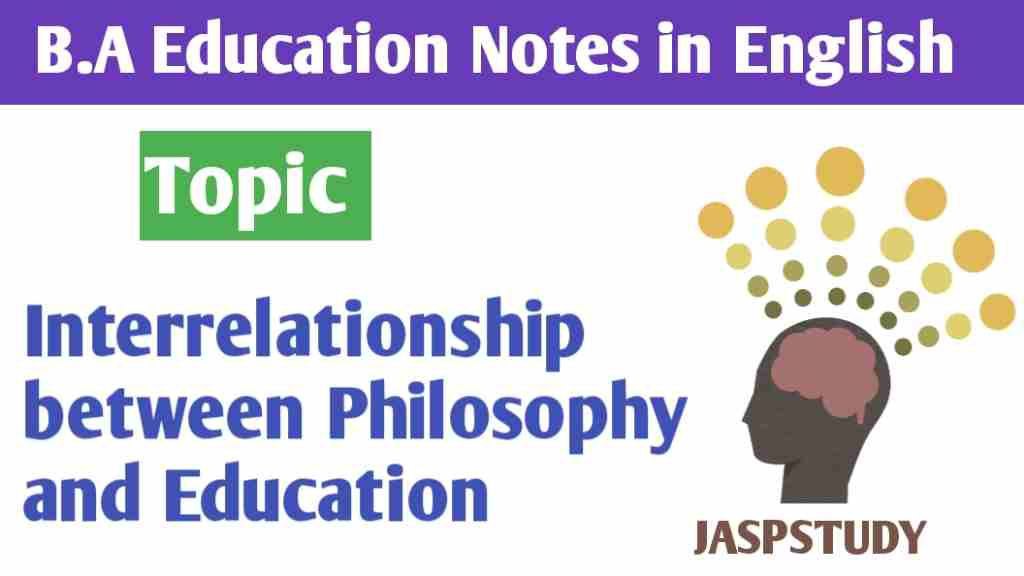In this Article we will Discuss about Interrelationship Between Philosophy and Education. In this post we will elaborate Meaning of Education, Meaning of Philosophy and Interrelationship Between Philosophy and Education.
Introduction
Education is a growing science and philosophy is the cornerstone of the foundation of education. While the goal of philosophy is to explain the baffling mysteries of universe, the place of man in the universe and variegated problems created out of his wisdom and folly, the chief means of philosophy is education which has been correctly described as the dynamic side of philosophy. Education is a practical activity of philosophical thought.
Every educational practice is illumined with the backdrop of philosophy.
Fichte, therefore, very rightly observed “the art of education will never attain complete clearness without philosophy”.
Before discussing the relationship between philosophy and education first we would understand what is education and What is Philosophy.
Meaning of Education
Education enriches life by increasing the power and inclination to reason.it is not only a process of development but also an instrument of developing
the innate powers of an individual which has the capacity to develop them and make them manifest. Education is infact, apprenticeship of life.
Meaning is Philosophy
Philosophy is the discipline concerned with rational approach to answering questions of how one should live (ethics); what sorts of things exist and what are their essential natures (metaphysics); what counts as genuine knowledge (epistemology); and what are the correct principles of
reasoning (logic).
- Philosophy- Meaning, Definition,Nature And Branches
- Meaning Scope And Functions of Philosophy of Education
Interrelationship between Philosophy and Education

The relationship between philosophy and education is deeply connected, as both have a significant impact on each other. Philosophy is the study of fundamental questions about life, knowledge, values, and existence. Education, on the other hand, is the process of teaching and learning, where people pass knowledge, skills, and values from one person to another. The way we think about education is often shaped by philosophical ideas, and education itself helps develop and spread these ideas.
1. Philosophy Shapes Education
Philosophy plays a big role in shaping education. It helps to answer some of the most important questions about the purpose of education. For example, what should education teach? What is the goal of education? What is the role of the teacher? These questions are at the heart of philosophical debates. Different philosophers have different views about what education should focus on.
For instance, some philosophers believe that education should focus on developing a student’s mind, while others argue that it should teach practical life skills. Some philosophers believe that education should help individuals learn moral values, while others argue that education should be more about learning facts and knowledge. Philosophers’ ideas about the purpose of life, knowledge, and society help shape what is taught in schools and how it is taught.
2. Educational Philosophies
Over time, many different educational philosophies have emerged. These philosophies are based on different ideas about what is important in education and how learning should happen. Some of the key educational philosophies are:
Idealism – Idealism focuses on the development of the mind and the search for universal truths. Idealists believe that education should help students develop their intellectual abilities and learn about the ideal world of ideas and values. Teachers, according to this philosophy, should guide students in understanding abstract concepts and ideas. The goal of education in idealism is to cultivate students’ intellectual and moral growth.
Realism: Realism emphasizes the importance of teaching students about the real world. Realists believe that education should focus on subjects like science, mathematics, and history, helping students understand how the world around them works. According to realists, teachers should provide students with knowledge that is grounded in reality. Education, therefore, should be focused on practical knowledge that students can use in everyday life.
Pragmatism: Pragmatism focuses on the practical application of knowledge. Pragmatists believe that education should not just teach abstract knowledge but should help students solve real-world problems. Pragmatism emphasizes the importance of hands-on learning and encourages students to learn by doing. In this philosophy, students are seen as active participants in their learning, and the role of the teacher is to guide them through experiences that will help them learn and grow.
Existentialism: Existentialism focuses on the individual. Existentialists believe that education should help students discover who they are and what they believe. This philosophy values personal freedom, individuality, and choice. Existentialists argue that education should not just focus on academic knowledge but should also help students explore their own identities, values, and beliefs. Teachers should provide an environment where students can think critically and make their own decisions about the world around them.
Each of these educational philosophies has influenced different education systems and the way teaching is done. For example, a school that follows the philosophy of realism may focus on teaching subjects like science and math, while a school that follows idealism might put more emphasis on teaching ethics and intellectual growth.
3. Education Encourages Philosophical Thinking
While philosophy shapes education, education also encourages people to think philosophically. Education introduces students to different ideas, concepts, and ways of thinking. By studying history, literature, art, and other subjects, students learn to think critically and ask questions about the world. Education helps individuals develop their own ideas and beliefs about life, society, and knowledge.
When students learn about different philosophers and their ideas, they can better understand the world around them. Philosophers like Socrates, Plato, Aristotle, and others have shaped how we think about ethics, government, and knowledge. By studying their works, students learn to question assumptions, challenge traditional views, and think more deeply about important issues.
In this way, education acts as a bridge between philosophical ideas and practical life. By learning philosophy, students are encouraged to reflect on their own lives, beliefs, and values. This can lead to personal growth and the development of a more thoughtful, open-minded approach to life.
4. The Purpose of Education in Philosophy
Philosophers have different views about the purpose of education. Some philosophers believe that education’s main goal is to help students develop intellectual abilities, such as critical thinking, problem-solving, and reasoning skills. Others believe that education should focus more on developing moral character and social responsibility.
- Intellectual Development: Many philosophers argue that the main purpose of education is to help students develop their minds. Education should teach students to think logically, reason critically, and solve problems. By learning subjects like mathematics, science, and literature, students can sharpen their minds and prepare for the challenges of life.
- Moral Development: Other philosophers believe that education should focus on teaching students to be good people. Education should help students develop qualities like kindness, honesty, and responsibility. According to this view, education is not just about gaining knowledge but also about becoming a better person and contributing to society in a positive way.
- Social Development: Many philosophers believe that education should help students become active, responsible members of society. By learning about history, government, and social issues, students can understand their role in society and learn how to make a positive impact. Education should prepare students to be responsible citizens who can work together for the common good.
The purpose of education varies depending on which philosophical ideas are being followed. Some educational systems focus more on intellectual development, while others focus on moral and social development.
5. Philosophy and the Role of the Teacher
Philosophy also helps define the role of the teacher. Different educational philosophies suggest different roles for teachers. For example, in the idealist philosophy, the teacher is seen as a guide who helps students develop their intellectual and moral abilities. In the pragmatic philosophy, the teacher’s role is to help students learn through practical experiences and problem-solving. In existentialism, the teacher is there to encourage students to think for themselves and make their own choices.
The teacher’s role is shaped by the philosophy of education they follow. The teacher’s job is not just to give information but to help students grow and develop in different ways, whether intellectually, morally, or socially.
Conclusion
The relationship between philosophy and education is complex and important. Philosophy provides the ideas and principles that guide education, helping to shape what is taught, how it is taught, and why it is taught. At the same time, education helps individuals develop their own philosophical views and encourages critical thinking. Philosophy and education work together to shape individuals and society, creating thoughtful, knowledgeable, and responsible people. Understanding the connection between philosophy and education can help educators create better learning environments and help students gain a deeper understanding of the world around them.
- Origin and Geographical Extent of Harappan civilization
- Main features of Mathura Style of kushana Sculptural Art
- Features of the Harappan civilisation
- Sailent features of the town planning of Harappan civilization
- Write a detailed note on Kayatha Culture and its salient features
- Write an essay on Jorwe Culture
- Main Features of Mauryan Art
- Discuss The Philosophy of History of Arnold Toynbee
- Date of coronaion of Kanishka1|Date of Accession of Kanishka 1

